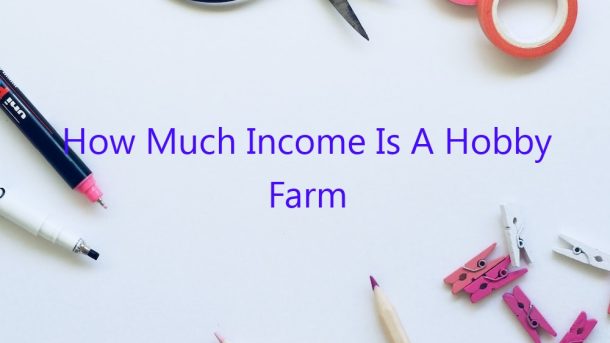A hobby farm is a farm that is maintained and operated primarily for pleasure, rather than for profit. Hobby farms can be small or large, and the amount of income that they generate can vary greatly.
In most cases, a hobby farm will generate enough income to cover the costs of operation, but it will not generate a significant profit. This is because a hobby farm is typically not as efficient as a commercially-operated farm.
The amount of income that a hobby farm generates will depend on a variety of factors, including the size of the farm, the type of crops or livestock that are raised, and the level of care and attention that is given to the farm.
In general, hobby farms tend to be smaller than commercial farms, and they typically raise crops or livestock that are not as profitable. Additionally, a hobby farm will typically require more labour and care than a commercial farm, which can increase the costs of operation.
Despite the fact that a hobby farm typically generates less income than a commercial farm, there are a number of benefits to owning a hobby farm. These benefits include the opportunity to connect with nature, the opportunity to learn about agriculture, and the opportunity to teach children about the farm life.
Overall, the amount of income that a hobby farm generates will vary depending on the size and type of farm, and the level of care and attention that is given to it. However, in most cases, a hobby farm will generate enough income to cover the costs of operation, but will not generate a significant profit.”
Contents
Do hobby farms make money?
Do hobby farms make money?
This is a question that many people have, and the answer is not always straightforward. There are a lot of factors to consider when assessing whether a hobby farm can be profitable.
One important consideration is the size of the farm. A hobby farm that is only a few acres may not be able to generate enough income to cover its costs. However, a larger farm may be able to generate a profit by producing enough crops or livestock to sell.
Another important factor is the location of the farm. If the farm is located in a rural area, the cost of land and labour may be lower than in a more urban area. However, the cost of inputs such as fertilizer and fuel may also be lower in rural areas.
The type of crops or livestock that are raised on the farm can also affect profitability. For example, raising dairy cows or pigs can be more profitable than raising chickens or rabbits.
There are a number of other factors to consider, such as the cost of inputs, the cost of labour, the price of crops or livestock, and the overhead costs of running a farm. So, while it is possible for a hobby farm to be profitable, it is not always easy to do so.
Is a hobby farm worth it?
There are a lot of factors to consider when deciding if a hobby farm is worth it. One of the most important things to consider is what you want to get out of the hobby farm. Do you want to produce your own food? Do you want to have animals for pets or to produce eggs or milk? Do you want to use the land for recreational activities, like hiking or camping?
Another important consideration is the cost of starting and maintaining a hobby farm. There are a lot of initial costs, like the cost of the land, the cost of the animals, and the cost of the equipment you’ll need. There are also ongoing costs, like the cost of feed and hay, and the cost of veterinary care.
Another thing to consider is your ability to care for the animals. If you don’t have any experience with animals, you’ll need to learn how to care for them properly. This includes providing them with the right food and water, cleaning their living area, and providing them with shelter from the elements.
Finally, you need to consider the time commitment required to run a hobby farm. If you’re not able to commit the time necessary to care for the animals and manage the land, the hobby farm may not be worth it for you.
How many acres is considered a hobby farm?
How many acres is considered a hobby farm?
A hobby farm is typically described as a small farm that is operated as a secondary occupation. It is typically used for the enjoyment of the farmer, rather than to generate a large income. Hobby farms vary in size, but most are under 100 acres.
There are a few factors that go into deciding if a property is a hobby farm. The main consideration is whether the farm is being operated as a business or a hobby. If the farm is generating a profit, then it is likely a business. If the farm is being operated primarily for pleasure, then it is likely a hobby farm.
Another consideration is whether the farm is self-sufficient. If the farmer is relying on income from the farm to support themselves, then it is more likely a business. If the farm is more of a side hobby, then it is more likely a hobby farm.
The size of the farm is also a factor. A small farm that is only producing a small amount of food may not be able to support a family, and is more likely a hobby farm. A larger farm that is producing a significant amount of food is more likely a business.
Ultimately, there is no definitive answer to this question. It depends on the specific circumstances of the farm. However, most people would consider a farm under 100 acres to be a hobby farm.
What does IRS consider a hobby farm?
What does IRS consider a hobby farm?
According to the IRS, a hobby farm is a farm where the primary purpose is not to make a profit. In other words, the farm is operated more as a hobby than as a business.
There are a few things the IRS looks at to determine whether a farm is a hobby farm or not. These include:
-The time and effort put into the farm
-The number of animals or plants raised on the farm
-The income generated by the farm
-The expenses incurred in running the farm
If the IRS finds that a farm is not being operated primarily for profit, it may be classified as a hobby farm. This could lead to tax implications for the farm’s owner, such as a higher tax rate or the inability to claim certain tax deductions.
So, what does the IRS consider a hobby farm? In general, a farm is considered a hobby farm if it is not being operated primarily for profit. The time and effort put into the farm, the number of animals or plants raised on the farm, and the income generated by the farm are all factors the IRS looks at when making this determination.
What type of farm is most profitable?
When it comes to farming, there are a variety of different options to choose from. Each option has its own unique set of pros and cons, and it can be difficult to determine which type of farm is most profitable. Here is a look at some of the most common types of farms, as well as an overview of the pros and cons of each type.
One of the most common types of farms is the row crop farm. These farms are typically used to grow crops such as corn, soybeans, and wheat. Row crop farms are profitable because they are able to produce a high yield per acre. However, they can be expensive to operate because of the need for expensive equipment and the need to hire laborers.
Another common type of farm is the dairy farm. Dairy farms are profitable because milk is a high-demand commodity. However, dairy farms can be difficult to operate, and they require a lot of land and equipment.
A third common type of farm is the cattle ranch. Cattle ranches are profitable because beef is a high-demand commodity. However, cattle ranches can be difficult to operate, and they require a lot of land and equipment.
When trying to determine which type of farm is most profitable, it is important to consider the pros and cons of each type.
How can I make money with 10 acres?
There are many ways to make money with 10 acres of land. Perhaps the most obvious way to generate income from a property of this size is to grow crops or raise livestock. With 10 acres of land, a farmer could produce a significant amount of food to sell at the local market.
Another option for generating income from 10 acres of land is to lease the property to a tenant. A tenant could use the land to grow crops or raise livestock, or they could use the land for other purposes, such as storage or manufacturing.
In addition to farming or leasing, there are many other ways to make money with 10 acres of land. A property this size could be used for recreational purposes, such as camping, hiking, or fishing. The land could also be used for commercial purposes, such as a driving range, a golf course, or a wedding venue.
Ultimately, there are many ways to make money with 10 acres of land. The key is to find a use for the property that fits the unique needs of the owner.
Can a hobby farm be a tax write off?
Yes, a hobby farm can be a tax write off. The most important factor in determining if a hobby farm can be a tax write off is whether the farm is operated for profit or not. If the farm is operated for profit, then any expenses incurred in running the farm can be written off as a business expense. If the farm is operated as a hobby, then the expenses incurred can only be written off if they exceed the income generated from the farm.




